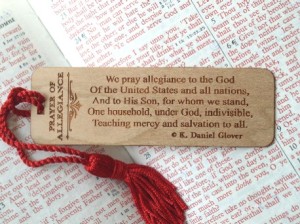By Danny Glover
 All Christians no doubt were as disappointed and as dumbfounded as I was to hear that two federal judges on June 26 declared that the phrase “under God” makes the Pledge of Allegiance unconstitutional. But the truth is that such religio-political fights really do not concern Christians much.
All Christians no doubt were as disappointed and as dumbfounded as I was to hear that two federal judges on June 26 declared that the phrase “under God” makes the Pledge of Allegiance unconstitutional. But the truth is that such religio-political fights really do not concern Christians much.
Policymakers added the phrase “under God” to the pledge, mandated the motto “In God We Trust” on coins and currency, and replaced “E pluribus unum with “In God We Trust” as the national motto in the 1950s. All were symbolic gestures prompted by the Cold War with the “godless communists;” none represented the substance of faith that God demands of His children.
The same is true of today’s efforts to “keep God in the pledge,” to post the Ten Commandments and the motto “In God We Trust” on public property, and to sanction prayer in schools. All are largely examples of religious posturing by leaders who otherwise reject God’s guidance.
Their “sacrifices” are like the hypocrisies Christ condemned: charity designed for publicity, prayer in the synagogues and on the street corners, and phony gloom while fasting – all wrongly aimed at self-glorification in this life rather than at glorifying God (Matt. 6:1-8, 16-18).
Jesus directed his strongest rebuke toward the scribes and Pharisees, and the depth of their hypocrisy was best demonstrated by their emphasis on symbols. They broadened their phylacteries — small boxes containing texts of Scripture — and lengthened their garment tassels as testaments to their self-perceived religious importance (Matt. 23:5).
Today’s public displays of religion are just as superficial as their tithes of mint, dill and cumin, which were offered to the neglect of “weightier” laws on justice, mercy and faithfulness. The little things are important, Christ told them, but they alone are not sufficient (Matt. 23:23).
The Supreme Court has ruled that the “ceremonial deism” of America is legal precisely because it has “lost through rote repetition any significant religious content.” That sounds very much like the “meaningless repetition” that Christ condemned in prayer (Matt. 6:7). And the posting of the Ten Commandments, rather than the keeping of them, smacks of the misguided Pharisaical ideas about the altar and the sacrifices (Matt. 23:18-19).
Symbolism does have its place in religion. God requires, for instance, that we partake of the Lord’s Supper, a symbol of Christ’s sacrifice of body and blood for our sins. But merely eating the bread and drinking the juice will condemn a person’s “unworthy” soul (I Cor. 11:23-29).
We Christians must remember those lessons when pandering politicians and self-proclaimed religious leaders push their latest cause into the spotlight. Our righteousness must run far deeper than their symbolic religiosity. Christ’s admonition to his followers in Matt. 23:2-3 — do “all that [the scribes and Pharisees] tell you … but do not do according to their deeds; for they say things and do not do them” — remains a sound principle today.
So on this Independence Day, rather than pledge your allegiance to a nation that too often only says it is under God, consider this Prayer of Allegiance that I wrote to God Himself — and, more importantly, incorporate the sentiment into your lives:
Unto His Son, for whom we stand
One church, under faith, indivisible
With mercy and salvation for all
